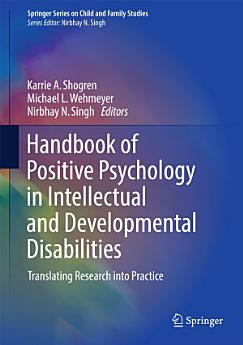Handbook of Positive Psychology in Intellectual and Developmental Disabilities: Translating Research into Practice
About this ebook
Topics featured in the Handbook include:
- Translating the quality of life concept into practice.
- The Casual Agency Theory and its implications for understanding self-determination.
- The Mindfulness-Based Individualized Support Plan (MBISP) and its use in providing support to people with intellectual and developmental disabilities.
- The unique role that friendship plays to people’s lives and social well-being.
- Supported Decision-Making (SDM) as an alternative to guardianship.
- A positive psychology approach to aging and retirement.
The Handbook of Positive Psychology in Intellectual and Developmental Disabilities is a must-have resource for researchers, professors, and graduate students as well as clinicians and related professionals in clinical child and school psychology, behavioral therapy, social work, applied behavioral analysis, recreational therapy, occupational therapy, education, speech and language pathology, psychiatry, clinical medicine, and nursing.
About the author
Karrie A. Shogren, PhD, is a Professor of Special Education, Senior Scientist at the Life Span Institute, and Director of the Kansas University Center on Developmental Disabilities at the University of Kansas. Dr. Shogren has published extensively in the intellectual and developmental disabilities field, and her research focuses on assessment and intervention in self-determination and positive psychology, and the application of the supports model across the lifespan. She is co-Editor of Remedial and Special Education and Inclusion.
Michael L. Wehmeyer, PhD, is the Ross and Mariana Beach Distinguished Professor of Special Education and Senior Scientist and Director, Beach Center on Disability, at the University of Kansas. Dr. Wehmeyer’s research focuses on self-determination, understanding and conceptualizing disability, the application of positive psychology to disability, conceptualizing and measuring supports and support needs, and applied cognitive technologies. He is the co-editor of American Association on Intellectual and Developmental Disabilities ejournal, Inclusion.
Nirbhay N. Singh, PhD, BCBA-D, is Clinical Professor of Psychiatry and Health Behavior at the Medical College of Georgia, Augusta University, Augusta, GA and CEO of MacTavish Behavioral Health, in Raleigh, NC. His interests include mindfulness, behavioral and psychopharmacological treatments of individuals with diverse abilities, assistive technology, and mental health delivery systems. He is the Editor-in-Chief of three journals: Journal of Child and Family Studies, Mindfulness, and Advances in Neurodevelopmental Disorders, and Editor of three book series: Mindfulness in Behavioral Health, Evidence-based Practice in Behavioral Health, and Children and Families.








